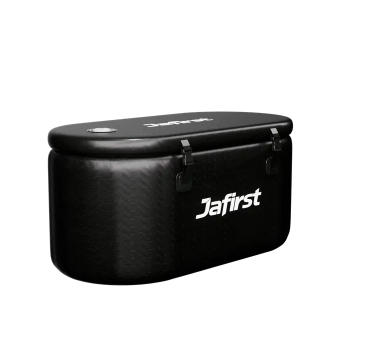Views: 0 Author: Site Editor Publish Time: 2025-09-29 Origin: Site











Ice baths, or cold water immersion, have exploded in popularity among athletes and wellness enthusiasts. They promise faster recovery, reduced inflammation, and sharper mental focus. People ask, are ice baths good for you? The answer depends on your goals, health, and how you approach cold exposure.
We’ll explore the science, benefits, risks, and best practices for ice baths. By the end, you’ll understand how they work and who can gain the most.
Ice baths are tubs or pools filled with cold water, often near freezing. Cold water immersion (CWI) includes natural lakes, rivers, or commercial cold-plunge tanks.
Home ice baths: Bathtub filled with ice and water.
Cold plunge tanks: Compact units with precise temperature control.
Natural immersion: Lakes, rivers, or ocean swims.
Ice baths trigger immediate changes in the body:
Vasoconstriction: Blood vessels shrink to conserve heat.
Slowed metabolism: Reduces inflammation and tissue breakdown.
Endorphin release: Improves mood and mental alertness.
Long-term, regular cold exposure adapts the nervous system, improves circulation, and enhances stress tolerance.
| Study Focus | Findings |
|---|---|
| Muscle recovery | Reduced soreness, faster return to training |
| Inflammation | Cold water lowers inflammatory markers |
| Athletic performance | Short-term benefits for endurance and recovery |
| Mental resilience | Cold exposure linked to increased focus and alertness |

When you push your body to the limit, whether it’s a long run, a grueling weightlifting session, or an intense team sport, your muscles take a beating. Using an Ice Bathtub can be a powerful tool for recovery. The cold water helps slow tissue damage, reducing inflammation that causes soreness. This means you can bounce back faster and return to training sooner. Whether you’re a runner, weightlifter, or team sport athlete, an Ice Bathtub provides that extra edge.
Quick facts:
Spending 10–15 minutes in water at 50–59°F in an Ice Bathtub improves recovery time.
Daily use or post-training sessions can enhance performance.
Particularly beneficial for athletes needing quick recovery between sessions.
Ice baths aren’t just for muscles. Immersing yourself in an Ice Bathtub triggers the release of endorphins and dopamine. These chemicals boost mood, lower stress, and sharpen focus. Many people report feeling more alert and resilient after cold water sessions. Incorporating an Ice Bathtub into a routine can even support mindfulness or resilience-building practices, helping you better handle daily challenges.
Regular immersion in an Ice Bathtub may also strengthen your immune system. Research shows people who take cold showers or ice baths tend to take fewer sick days. The cold exposure energizes the body, improves alertness, and enhances overall well-being. Using an Ice Bathtub consistently may make your immune system more effective at fighting infections.
Cold exposure in an Ice Bathtub activates brown fat, which burns calories to generate heat. This process can support blood sugar regulation, improve cholesterol levels, and enhance metabolism. Over time, consistent use of an Ice Bathtub may help maintain a healthy weight and reduce the risk of metabolic disorders, offering long-term health benefits.
While an Ice Bathtub offers many benefits, it also comes with risks. Hypothermia can occur if you stay in cold water too long, causing shivering, confusion, or slurred speech. Frostbite is another concern for hands, feet, and extremities. To minimize danger, limit immersion time and prepare a plan for warming up quickly.
Cold therapy in an Ice Bathtub after resistance training can reduce muscle growth. The cold inhibits some natural healing and growth processes. Timing matters: using an Ice Bathtub after endurance or high-intensity workouts still delivers recovery benefits without hindering muscle development.
An Ice Bathtub isn’t safe for everyone. People with heart disease, uncontrolled blood pressure, diabetes, or nerve issues should avoid prolonged cold exposure. These conditions affect temperature regulation and stress response. Always consult a healthcare professional before starting ice bath therapy.
Diving into the world of ice baths? Start slow and steady. Begin with short sessions of just 2–3 minutes at a relatively mild 59°F (15°C). This gives your body time to adjust without overwhelming it. As you grow more comfortable, gradually increase the duration and lower the temperature. This approach helps you build tolerance and ensures that you don’t shock your system. Remember, the goal is to enhance recovery and well-being, not to freeze yourself out.
Safety first! Always measure the water temperature accurately. A simple kitchen thermometer can be your best friend here. Having a buddy nearby is crucial, especially if you’re new to ice baths. They can help you keep track of time and offer support if you start to feel overwhelmed. And don’t forget to prepare warm clothing and towels for after the session. Warming up quickly is key to preventing post-immersion discomfort.
To get the most out of your ice baths, limit each session to 10–15 minutes. Going longer can increase the risk of hypothermia. Aim to use cold immersion 2–4 times per week, unless your healthcare provider or sports medicine specialist advises otherwise. And always place your ice bath in a safe, slip-free area to avoid accidents. A non-slip mat can be a smart addition to your setup.

It’s generally recommended to start with 10–15 minutes. This duration allows your body to reap the benefits without risking hypothermia. As you get more accustomed to the cold, you can gradually increase the time to 20 minutes, but never exceed 30 minutes.
Begin with water at around 59°F (15°C). This is a comfortable starting point for most people. Over time, you can lower the temperature to 50–54°F (10–12°C) for more intense cold exposure. However, avoid letting the water get too cold, as this can increase the risk of frostbite.
After your session, it’s crucial to warm up gradually. Avoid jumping into a hot shower or sauna, as this can cause blood vessels to dilate too quickly, leading to dizziness or fainting. Instead, dry off with warm towels, put on warm clothing, and consider light activities like stretching or walking to help your body warm up naturally.
Absolutely! Combining ice baths with proper nutrition, stretching, and other recovery techniques can enhance your overall results. For example, consuming anti-inflammatory foods and engaging in regular stretching can work synergistically with ice baths to improve muscle recovery and reduce soreness.
Yes, ice baths can have a positive impact on mental health. The cold water triggers the release of endorphins and dopamine, which can improve your mood, lower stress levels, and sharpen your focus. Many people find that incorporating ice baths into their routine helps them feel more alert and mentally resilient, making it a valuable tool for stress management and overall well-being.
Ice baths offer clear benefits for recovery, mental health, and metabolism. Risks exist, especially for long exposure or pre-existing conditions. Correct use maximizes results while minimizing danger.
For those looking to integrate cold therapy safely and efficiently, Shandong Addotron Robotics Technology Co., Ltd. provides advanced equipment and solutions that make regular ice bath routines more accessible. Their technology helps maintain consistent water temperature, ensures safety, and reduces the effort required to set up cold immersion sessions.